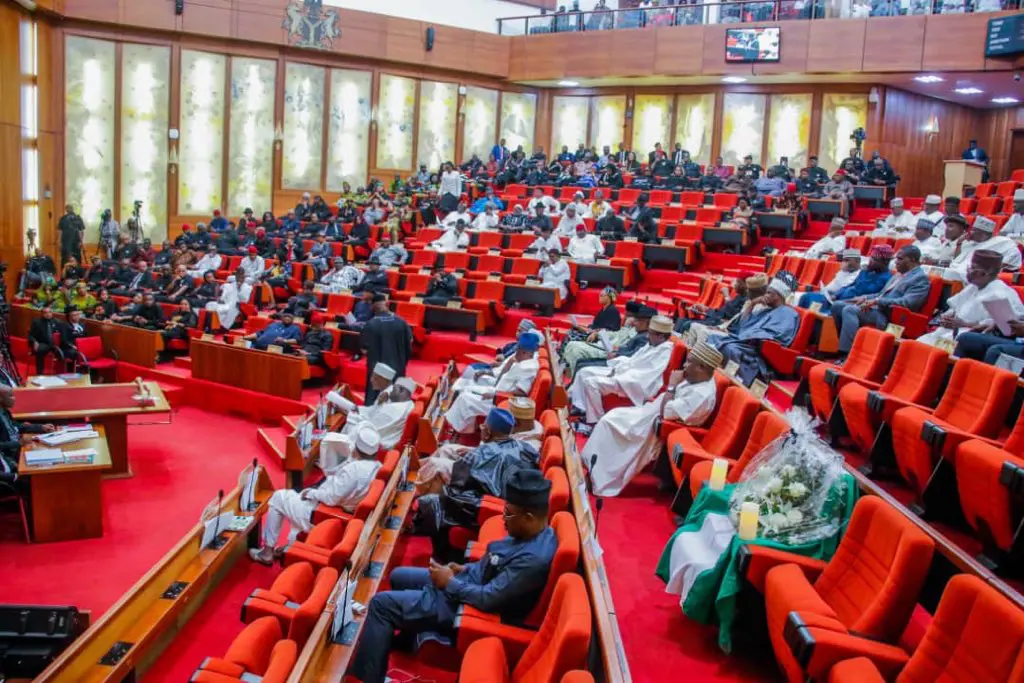The Senate on Thursday directed the Minister of Finance, Wale Edun, Accountant-General of the Federation, Samsudeen Ogunjimi and Director-General of Budget Office, Tanimu Yakubu, to submit a comprehensive performance report on the 2024 budget within two weeks.
Analysts have expressed concerns that the move could delay President Bola Tinubu’s presentation of the 2026 fiscal proposal to the National Assembly.
The upper chamber, through its Committee on Finance, warned that the report must also capture projections for the capital component of the 2025 budget before consideration of the Medium-Term Expenditure Framework and Fiscal Strategy Paper (MTEF/FSP) for 2026–2029 can proceed.
The order came from the Senate Committee on Finance, chaired by Senator Mohammed Sani Musa (Niger East), after a one-and-a-half-hour closed-door meeting with the three top officials.
The MTEF/FSP is a critical fiscal planning document that provides the foundation for Nigeria’s annual budget.
It outlines the Federal Government’s macroeconomic assumptions, revenue projections, spending priorities, and debt management strategies over three years.
Under the Fiscal Responsibility Act, the document must be approved by the National Assembly before the President can present the next budget.
But Musa insisted the Senate’s consideration of the MTEF/FSP for 2026–2029 would only follow after the submission of the requested documents on October 23.
“The expectations we are having are for the ministry to, as a matter of urgency, bring the MTEF for 2026 to 2029. The minister has briefed us, and we have collectively agreed that we are making progress, but we need to make more progress,” Musa told journalists after the session.
“We have heard from the Accountant-General and the Director-General of Budget on where we are with the budgets — the payments so far released, warrants signed, as well as the 2025 authority to incur expenditure for agencies to be able to execute their capital projects.
“We have all agreed that we want documented evidence of the performance of 2024 and our expectations for the 2025 budget before we start talking about the MTEF for 2026. The Honourable Minister of Finance has agreed to oblige us with that progress report, and we will reconvene on October 23,” he added.
Before the meeting went behind closed doors, committee members were confronted with conflicting accounts of budget performance from the Federal Government’s economic team.
While Finance Minister Wale Edun claimed the implementation of the capital components of the 2024 and 2025 budgets was recording “high performance,” the Director-General of the Budget Office, Tanimu Yakubu, painted a more sobering picture.
According to Yakubu, the assumptions underpinning both fiscal years’ budgets were largely unmet due to global and domestic shocks.
“We have indeed had a turbulent year — one in which most of the assumptions underpinning the 2024 and 2025 budgets turned out differently from projections. Oil revenue, assumed at $75 per barrel, fell short by between $10 and $15 due to global price fluctuations.
“Inflation also rose beyond projections, affecting borrowing costs and debt service performance, which significantly exceeded targets. Furthermore, the unforeseen fiscal implications of the Petroleum Industry Act (2022) have compounded our challenges.
“Under the Act, 30 per cent of gross oil revenue and 30 per cent of oil and gas profits are retained for upstream operations, while the Federal Government also bears the NNPC’s operating costs.
“This has reduced the Federation Account allocation by nearly 70 per cent of what used to accrue. In addition, crude oil output has been lower than projected in the MTEF approved by the National Assembly,” he said.
The Senate’s insistence on a detailed performance evaluation comes amid rising fiscal pressures, declining oil revenue, and increasing debt service costs — all of which could complicate the formulation of the 2026–2029 economic framework.
The Punch

